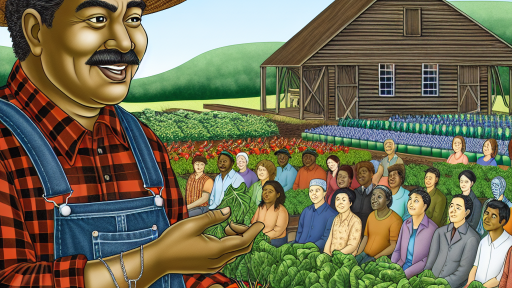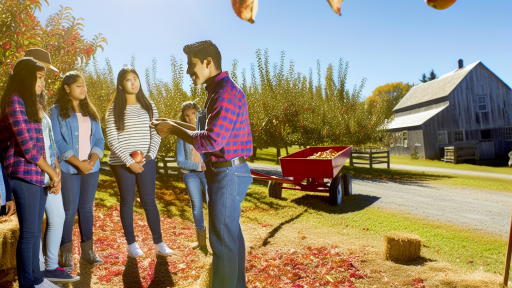Introduction to Agri-Tourism
Agri-tourism blends agriculture and tourism for mutual benefit.
This sector allows farms to diversify their income streams.
It invites visitors to engage with farming activities and experiences.
Moreover, agri-tourism promotes local culture and traditions.
Overall, it supports community development and sustainability.
Definition of Agri-Tourism
Agri-tourism refers to any recreational activity on a working farm.
These activities may include farm stays, tours, and workshops.
They also encompass events like harvest festivals and farm-to-table dinners.
Agri-tourism helps educate visitors about agriculture and food production.
Overview of Agri-Tourism
Agri-tourism is gaining popularity among modern consumers.
People seek authentic experiences and connections to their food sources.
Thus, farmers can utilize their land to attract visitors.
Moreover, this trend fosters appreciation for rural life and farming challenges.
Farmers benefit from additional income through this diversified approach.
Historical Context: The Evolution of Farming and Tourism
Early Agricultural Practices
Farming has deep roots in human history.
Transform Your Agribusiness
Unlock your farm's potential with expert advice tailored to your needs. Get actionable steps that drive real results.
Get StartedInitially, communities relied on subsistence agriculture.
Farmers grew enough food to feed their families.
They cultivated local crops according to climate and soil conditions.
The Rise of Commercial Agriculture
As societies advanced, agriculture became more commercialized.
Farmers began to produce surplus food for trade.
This change allowed specialization in farming techniques.
Consequently, farmers could focus on specific crops.
Tourism Emergence
In the 19th century, travel became more accessible.
People sought leisure and adventure outside urban areas.
This demand led to the development of tourism as an industry.
Farmers recognized an opportunity in this emerging market.
Agri-Tourism Development
Agri-tourism began to flourish as a concept in the late 20th century.
Farmers opened their doors to tourists seeking authentic experiences.
They offered activities such as farm tours and workshops.
Such initiatives helped bridge the gap between consumers and growers.
The Modern Agri-Tourism Era
Today, agri-tourism blends agriculture and tourism seamlessly.
Modern farmers embrace new opportunities for income.
This approach supports sustainability and conservation efforts.
Travelers increasingly seek meaningful, immersive experiences.
Economic Benefits: How Agri-Tourism Boosts Farmers’ Income
Direct Revenue Streams
Agri-tourism offers farmers a direct way to generate income.
Visitors pay for experiences like pumpkin picking or farm tours.
These activities create an additional revenue stream beyond traditional sales.
Consequently, farmers can diversify their income sources effectively.
Extended Season of Operation
Agri-tourism extends the operational season for many farms.
Showcase Your Farming Business
Publish your professional farming services profile on our blog for a one-time fee of $200 and reach a dedicated audience of farmers and agribusiness owners.
Publish Your ProfileFarmers can welcome visitors during harvest times and off-seasons.
This approach helps maintain cash flow throughout the year.
As a result, farms can mitigate the effects of seasonal fluctuations.
Enhanced Market Visibility
Agri-tourism increases a farm’s visibility in the local community.
It connects consumers directly with the source of their food.
Such engagement fosters loyalty and promotes farm products effectively.
Moreover, visitors often share their experiences, generating word-of-mouth marketing.
Cost-Effective Marketing Tool
Hosting agri-tourism events serves as a cost-effective marketing strategy.
Farmers can showcase their products without expensive advertising.
Through farm events, farmers create a personal connection with customers.
This relationship can lead to future purchases and long-lasting customer loyalty.
Community Engagement
Agri-tourism encourages community engagement and local participation.
Farmers often collaborate with local businesses to create events.
This collaboration promotes regional unity and strengthens local economies.
Importantly, community support boosts the sustainability of agri-tourism efforts.
Educational Opportunities
Agri-tourism also provides educational opportunities for visitors.
Farmers can share knowledge about sustainable farming practices.
Workshops and tours educate audiences about agricultural processes.
This exchange of information enhances public understanding of farming.
Learn More: Permaculture Strategies For Sustainable Farming
Cultural Exchange: Promoting Local Heritage and Traditions
Embracing Local Culture
Agri-tourism offers farmers a platform to showcase their local culture.
Through farm tours, visitors can experience traditional farming practices.
This interaction builds appreciation for regional heritage.
Visitors often gain insight into local customs and lifestyles.
Highlighting Traditional Products
Farmers can promote unique crops and artisanal products effectively.
For example, local cheeses, homemade jams, or specialty wines attract tourists.
These products reflect the area’s agricultural history and diversity.
Furthermore, farmers can explain the significance of these goods.
Celebrating Local Festivals
Agri-tourism allows farmers to host traditional festivals on their farms.
Events like harvest festivals bring the community together.
Visitors enjoy local music, food, and crafts during these occasions.
Such celebrations foster cultural understanding and connections.
Educational Opportunities
Farmers can provide educational workshops for visitors.
These workshops can cover topics like organic farming or sustainable practices.
Participants learn valuable skills while supporting local agriculture.
Moreover, education promotes awareness of agricultural issues.
Strengthening Community Ties
Agri-tourism encourages collaboration among local businesses.
Farmers can partner with restaurants and artisans to promote their products.
Together, they create a network that supports local economies.
This synergy enhances the overall agricultural experience for visitors.
Showcase Your Farming Business
Publish your professional farming services profile on our blog for a one-time fee of $200 and reach a dedicated audience of farmers and agribusiness owners.
Publish Your ProfileExplore Further: Supporting Youth Agriculture Through School Programs
Environmental Stewardship: Sustainable Practices in Agri-Tourism
Promoting Biodiversity
Agri-tourism plays a crucial role in promoting biodiversity.
Farmers can cultivate diverse crops through agri-tourism activities.
By showcasing various plant and animal species, farmers educate visitors.
This engagement increases awareness of local ecosystems.
Soil Health Management
Sustainable practices improve soil health on farms.
Cover cropping and crop rotation are effective methods.
These techniques enhance soil structure and fertility.
Farmers can demonstrate these practices to tourists.
This fosters a greater appreciation for sustainable farming.
Water Conservation Techniques
Efficient water use is vital in modern agriculture.
Agri-tourism allows farmers to implement water-saving technologies.
Techniques such as drip irrigation minimize water wastage.
Farmers can share their strategies with visitors.
This creates awareness about the importance of conservation.
Waste Reduction Practices
Minimizing waste is essential for sustainable farming.
Agri-tourism offers opportunities to teach waste reduction methods.
Farmers can show how to compost organic waste effectively.
Implementing recycling initiatives also benefits the farm.
Visitors learn valuable lessons about sustainable living.
Community Engagement
Agri-tourism fosters strong community ties.
Farmers collaborate with local organizations for events.
Such partnerships promote environmental stewardship.
Farmers can involve visitors in conservation projects.
This instills a sense of responsibility toward the environment.
Gain More Insights: Farm-To-Table Ethical Supply Chain
Challenges Faced by Farmers: Balancing Traditional Farming and Tourism
Understanding the Dual Role of Farmers
Modern farmers are increasingly wearing two hats.
They must maintain their traditional farming practices.
At the same time, they are becoming hosts to tourists.
This dual role creates unique challenges.
Time Management Issues
Farmers often struggle to manage their time effectively.
Farming requires extensive hours throughout the year.
Adding tourism activities complicates their schedules.
They must balance fieldwork with welcoming visitors.
Financial Considerations
Implementing agri-tourism can strain financial resources initially.
Farmers need to invest in additional infrastructure.
Expenses include creating accommodations and facilities for tourists.
Moreover, maintaining traditional farms while investing in tourism is crucial.
Maintaining Farm Integrity
Farmers must preserve their agricultural identity.
They often face pressure to commercialize aspects of their farms.
Showcase Your Farming Business
Publish your professional farming services profile on our blog for a one-time fee of $200 and reach a dedicated audience of farmers and agribusiness owners.
Publish Your ProfileBalancing authenticity with tourist expectations is difficult.
Regulatory Challenges
Many regions have strict regulations regarding tourism operations.
Farmers must navigate zoning laws and permits.
Understanding these regulations can require significant effort.
Ultimately, compliance is essential for successful tourism ventures.
Customer Engagement and Experience
Providing a memorable experience for visitors is essential.
Farmers must develop engaging activities beyond traditional farming.
They need to offer tours, workshops, and interactive sessions.
Marketing and Promotion
Promoting agri-tourism requires specific marketing strategies.
Farmers may lack experience in marketing their farms.
They must learn to attract and retain visitors effectively.
Building relationships with local tourism agencies can help.
Explore Further: CSA Membership Essentials for Farmers

Marketing Agri-Tourism: Strategies for Attracting Visitors
Identifying Target Audiences
First, identify your target audience for agri-tourism.
Consider families, school groups, and food enthusiasts.
Understanding their preferences guides your marketing efforts.
Moreover, consider local and regional tourists as potential visitors.
Creating Engaging Experiences
Design engaging activities that resonate with visitors.
Offer farm tours, fruit-picking events, and educational workshops.
Additionally, consider gourmet farm-to-table dining experiences.
These unique offerings create memorable interactions.
Utilizing Social Media
Leverage social media platforms to promote your agri-tourism business.
Create visually appealing posts showcasing your farm activities.
Engage with followers by sharing behind-the-scenes content.
Furthermore, run seasonal promotions to attract visitors.
Partnering with Local Businesses
Explore partnerships with local businesses to enhance visibility.
Collaborate with restaurants for special farm dinners.
Work with local hotels for package deals that include farm visits.
This strategy expands your reach and builds community support.
Participating in Local Events
Participate in community and agricultural events to gain exposure.
Host open farm days to invite the community to your farm.
Additionally, attend farmers’ markets to showcase your offerings.
These activities foster connections and attract new visitors.
Implementing Online Booking Systems
Make it easy for potential visitors to plan their trips.
Implement an online booking system for tours and events.
Clearly display pricing, schedules, and FAQs to assist visitors.
This convenience often leads to increased bookings.
Case Studies: Successful Agri-Tourism Ventures Around the World
Vineyard Tours in Tuscany
The rolling hills of Tuscany attract numerous agri-tourists each year.
Local vineyards offer guided tours and wine tasting experiences.
Visitors learn about traditional wine-making techniques and local grape varieties.
Showcase Your Farming Business
Publish your professional farming services profile on our blog for a one-time fee of $200 and reach a dedicated audience of farmers and agribusiness owners.
Publish Your ProfileThis venture significantly boosts the local economy.
Additionally, it educates tourists about sustainable farming practices.
Apple Picking in New York
In New York, several orchards invite families to pick their own apples.
This hands-on experience creates lasting memories for visitors.
Orchards often offer additional activities like hayrides and corn mazes.
These attractions draw large crowds in the fall season.
The combination of outdoor fun and local produce attracts a diverse audience.
Farm Stays in Australia
Farm stays in Australia provide unique lodging experiences.
Guests participate in daily farm activities alongside farmers.
This immersive experience fosters a deeper understanding of agriculture.
Many farms also offer educational workshops on food production.
As a result, farm stay programs contribute to rural tourism growth.
Cheese Production Workshops in France
In the French countryside, cheese production tours are very popular.
Visitors receive hands-on instruction in crafting traditional cheeses.
This knowledge enhances their appreciation for artisanal methods.
Cheese tours often include tastings paired with local wines.
Such experiences have become fundamental to the area’s tourism strategy.
Pineapple Plantations in Hawaii
Hawaii’s pineapple plantations provide engaging tours for tourists.
Guests explore fields and learn about pineapple cultivation.
The tours often culminate with fresh pineapple tasting sessions.
This connection between visitors and local agriculture strengthens community ties.
Moreover, it promotes awareness of Hawaiian farming practices.
Future Trends: The Growing Demand for Authentic Agri-Tourism Experiences
Rising Interest in Sustainable Practices
Consumers increasingly seek connections with sustainable farming practices.
As environmental awareness grows, agri-tourism offers insights into eco-friendly agriculture.
Travelers favor experiences that reflect conscious consumption.
This trend encourages farmers to adopt sustainable techniques.
Desire for Unique Experiences
Modern travelers crave authenticity in their experiences.
Agri-tourism allows guests to engage directly with farming life.
This interaction provides memorable experiences beyond typical vacations.
Farmers can showcase their unique stories, enhancing guest engagement.
Health and Wellness Focus
People increasingly prioritize health and wellness in their lifestyles.
Agri-tourism aligns with this trend through farm-to-table offerings.
Farmers can promote fresh produce and nutrition education.
This focus on health helps create a loyal customer base.
Community Engagement and Support
Agri-tourism fosters community connections and support structures.
Guests often leave with a deeper appreciation for local agriculture.
These connections can stimulate local economies.
Farmers benefit from increased sales and community involvement.
Technology Integration
Innovative technologies transform the agri-tourism landscape.
Digital platforms help farmers promote their experiences worldwide.
Showcase Your Farming Business
Publish your professional farming services profile on our blog for a one-time fee of $200 and reach a dedicated audience of farmers and agribusiness owners.
Publish Your ProfileVirtual tours and online bookings make agri-tourism more accessible.
Farmers can reach diverse audiences by embracing these tools.
Impact of Climate Change Awareness
Awareness of climate change influences tourism choices.
Travelers seek farms committed to sustainable practices.
Farmers can attract eco-conscious visitors by promoting their efforts.
This proactive approach enhances their marketability in agri-tourism.
Additional Resources
Guide to Arkansas Agriculture | Arkansas Farming Resources
Vivien Straus – Writer/Performer – After I’m Dead, You’ll Have to Feed …




